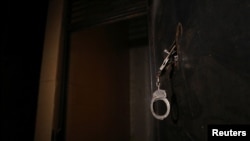One of the most feared institutions in Iran is the Ministry of Intelligence and Security, an agency ostensibly responsible for law enforcement and maintaining order in the country. But in reality the activities of MOIS, as it is called, include undermining the rule of law and abusing the rights of the Iranian people.
In 2012, the United States sanctioned MOIS for three types of activities: supporting terrorist groups like al-Qaida, Hezbollah and Hamas; aiding the Assad regime in its brutal crackdown on the Syrian people; and violating the human rights of the citizens of Iran.
That last has been clearly in evidence recently, according to the Center for Human Rights in Iran. Three political prisoners, Majid Assadi, Payam Shakiba and Mohamad Banazadeh were sentenced to prison and exile after MOIS pressured the court, a relative of one of the prisoners told the Center.
“The judge found them guilty in the presence of the Intelligence Ministry representative who practically direct the court proceeding,” the Center quoted the relative as saying.
The human rights monitor also reported that Hossein Zaman, a former IRGC commander turned musician and a supporter of 2009 reformist presidential candidate Mir Hossein Mousavi, said in an interview that the Intelligence Ministry has banned him from producing music to try and stop him from expressing his political views.
In her latest report on human rights conditions in Iran, UN Special Rapporteur Asma Jahangir called on the Iranian government “to reform the judicial system with a view to ensuring its independence.” She urged the government to protect judges, prosecutors and lawyers “against all forms of violence threats, retaliation, intimidation and harassment.”
In its latest human rights report, the State Department noted that the Iranian constitution provides the judiciary to be “an independent power” that is “free from every kind of unhealthy relation and connection. However, the State Department observed, “International observers continue to criticize the lack of independence of the country’s judicial system and judges, and maintained that trials disregarded international standards of fairness.”
The United States, as President Donald Trump has said, stands “in total solidarity with the Iranian regime’s longest-suffering victims: its own people…All nations of conscience,” he declared, “must work together to isolate Iran, deny it funding for terrorism and pray for the day when the Iranian people have the just and righteous government they deserve.”




